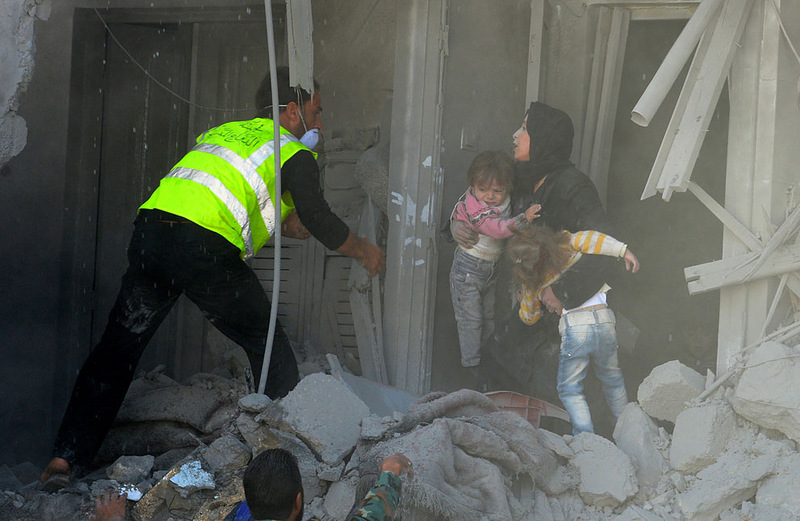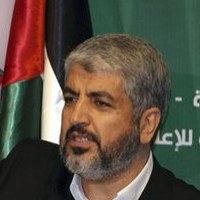![]()
Wed, Nov 21, 2012 | RubinReports | By Barry Rubin

This is what happening in Syria right now, women and children suffering from both sides: Syrian rebels and Assad’ loyalists. (source: ir-ingr.livejournal.com)
If 2011 was the year of the Arab Spring, 2013 looks to be the year of the Arab Fall. The hopes of quick, easy democracy have already been eclipsed by the rise of radical Islamist groups, which are no less extreme for coming to power through elections. And so the coming months are likely to see more disillusion, violence, and the entrenchment of Islamist regimes.
Let’s start with the Gaza Strip. Hamas is determined to fight Israel in the belief that it can win total victory. Its five years in power have had no moderating effect and it doesn’t care how much of Gaza is destroyed, how much the people there suffer, or how many are killed. It puts a priority on jihad and hopes that international pressure will always stop Israel from continuing its retaliation too long, much less overthrowing the regime there.
Hamas may be moved by fearing that the regime might fall, the people might turn actively against it (but with Fatah not trying to overthrow Hamas a real internal threat is unlikely). But the key factor is how much help Hamas can expect from Egypt. Right now and in the current war, Egypt is still cautious. The regime hasn’t really entrenched itself in power, begun Islamizing the country, and consolidated control over the army. But in the coming months, as the regime needs to distract its peoples attention from failures and mobilize support the next war with Hamas might involve some higher level of Egyptian involvement. And that would really be a conflict to shake the Middle East.
Then there was the place where hope for democracy was greatest, Tunisia, where the dramatic events of 2011 began. The Muslim Brotherhood won with just over 40 percent of the votes — with the secularists split into four rival parties — and formed a government that was to oversee the transition and prepare a constitution.
Now, however, there is a violent Salafist movement which has clashed with secularists and is trying to impose its brand of Sharia on the society. There have been street battles, deaths, and attacks on police stations. A local secular party leader was murdered by Islamists; an Islamist stabbed a police chief and in response to that attacker’s arrest, hundreds of armed Salafists went into the streets threatening retaliation. Rioters torched the American school, attacked the U.S. embassy, and plotted to kidnap several members of Tunisia’s small Jewish community.
Islamic clerics are increasingly outspoken in their demands for a total transformation of the country. That doesn’t mean they will win but it does mean there will be a growing atmosphere of intimidation, violence, and extremism. Despite a lot of talk and some international conferences with lots of air travel and nice banquets, there has been no massive international aid effort for Tunisia. Tourism is plummeting.
The “moderate” Islamist Rachid al-Ghannouchi, gives speeches to loyalists explaining that it will take time to impose Sharia law. First, the Islamists have to get their people into controlling the government ministries and the army.
Everything that’s been happening in Tunisia has been taking place on a far larger scale in Egypt. We still haven’t seen a draft of the constitution but since it is being written by the Brotherhood and Salafists the limit on Islamist dictatorship will only be what they are willing to put into it as a sign of their patience and caution. The army was quickly taken over with the forced retirement of lots of officers and their replacement by opportunists willing to follow the Brotherhood’s orders.
During the coming months, we can expect to see more attacks on Christians, women rejecting Islamist restrictions, and secularists. Assaults on American institutions in these two countries are quite likely, even if there is not some new offensive video. What is especially disconcerting is the growing data on the formation of terrorist groups. In the Sinai peninsula, there is already a low-level war going on as Salafists launch attacks on dissidents, police stations, and across the border into Israel.
One factor that has definitely not changed in Middle Eastern politics is how violence and killing — or the threat to do so — is not just a last resort, it’s the first resort.
For example, a Syrian opposition activist and a pro-Hizballah Lebanese journalist were being interviewed on Al-Arabiya television, the more moderate rival of al-Jazira. The activist, Ammar al-Qurabi, director-general of the National Organization of Human Rights in Syria, at one point remarked that Hizballah Secretary-General Nasrallah would end up being found hiding in a sewer like, he said, Libyan dictator Muammar al-Qadhafi. He might also have mentioned that Iraqi dictator Saddam Hussein was captured while hiding in a hole. Both former dictators were executed.
The journalist, Ghassan Jawwad, angrily responded, “You will be killed” for saying that. The host tried to calm Jawwad in vain.
Qurabi later remarked, “This is their response to any attempt at dialogue,” he said. A Lebanese friend of mine once remarked that a Syrian official could never say anything without including a threat. And thus Qurabi added, “This was the basis for the revolution in Syria.” But it is also the basis for the death of tens of thousands in Syria and increased violence in Lebanon.
Three events that might not make it into 2013 — they could take until 2014 — but whose signs will be increasingly visible, are:
— The end of the Syrian civil war with the overthrow of the Bashar al-Asad regime and the coming to power of a rebel coalition dominated by the Muslim Brotherhood and Salafists.
— An economic crisis in Egypt that will drive the Brotherhood regime — and simultaneously give it an excuse — toward greater extremism, a crackdown on dissidents, and a growing hysteria against the United States and Israel.
— Iran obtaining nuclear weapons or being attacked by Israel.
In Libya, though, things may move more quickly. There, in contrast to Egypt and Tunisia, there is no Islamist regime to appease the Salafists or keep them under control. The killing of four Americans in Benghazi seems like a prelude to a new Libyan civil war. Radical Islamists, with support from some of the armed militias that did or did not join the country’s army, try to overthrow what they see as a Western puppet regime despite its winning an election.
The bitter fruits of the Obama Administration’s pro-Islamist policy will be increasingly visible. The only question is whether the Obama Administration will still be around to respond ineffectively or even to keep helping the anti-American forces.
[For a graphic vision of what might be coming elsewhere see this amazing collection of Russian photos from Syrian civil war Photos 5-8: the killing by rebels of a guy in civilian clothes (pro-regime militiaman?) Most of the weapons are AK-47 and other Russian equipment with the exception of a futuristic-looking AUG, Austrian-made assault rifle. (Military affairs consultant, Daniel Rubin).]
[And for a really good lecture on the realities of Egypt and of Obama policy there — including the issue of the Muslim Brotherhood and nuclear weapons — see the lecture by Raymond Stock here and here.]
Barry Rubin is director of the Global Research in International Affairs (GLORIA) Center and editor of the Middle East Review of International Affairs (MERIA) Journal. His latest book, “Israel: An Introduction“, has just been published by Yale University Press. Other recent books include “The Israel-Arab Reader” (seventh edition), “The Long War for Freedom: The Arab Struggle for Democracy in the Middle East” (Wiley), and “The Truth About Syria” (Palgrave-Macmillan). The website of the GLORIA Center and of his blog, Rubin Reports. His original articles are published at PJMedia.



 RSS
RSS










Latest Comments
Hello Mike, Thank you for your positive feedback to the article. I felt there wasn’t too much critical analysis of ...
Thanks for this considered and well constructed article. A follow up article on the manner in which the editorial contro...
THE CLUELESSNESS OF CLAIMING THAT OBAMA'S MIDDLE EAST POLICIES WERE A FAILURE CANNOT BE FURTHER FROM THE TRUTH, WHAT THE...
As long as Obama is the president of the usa do not trust the us government......
Thank you for an good read....